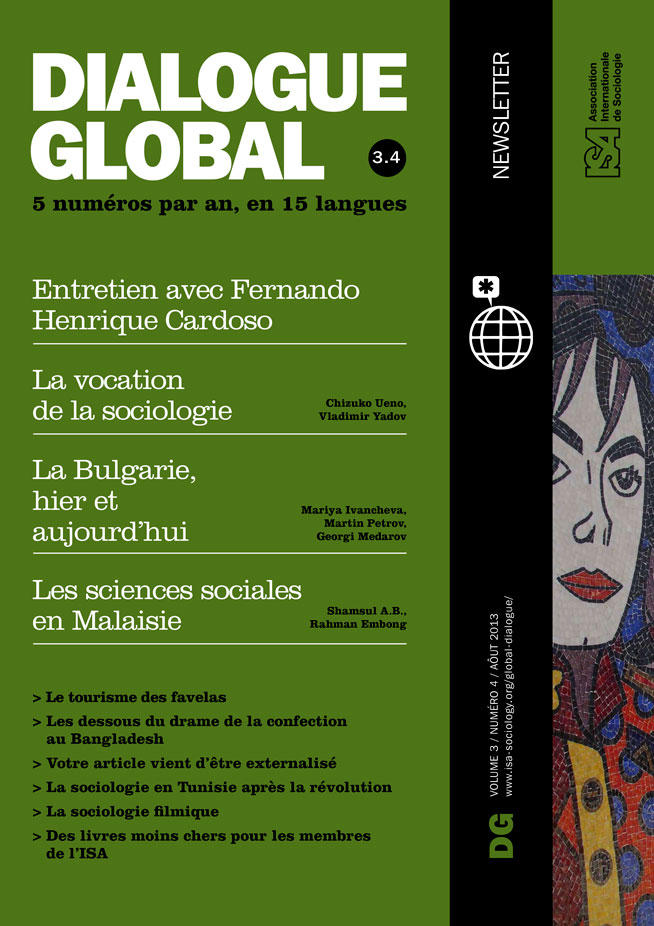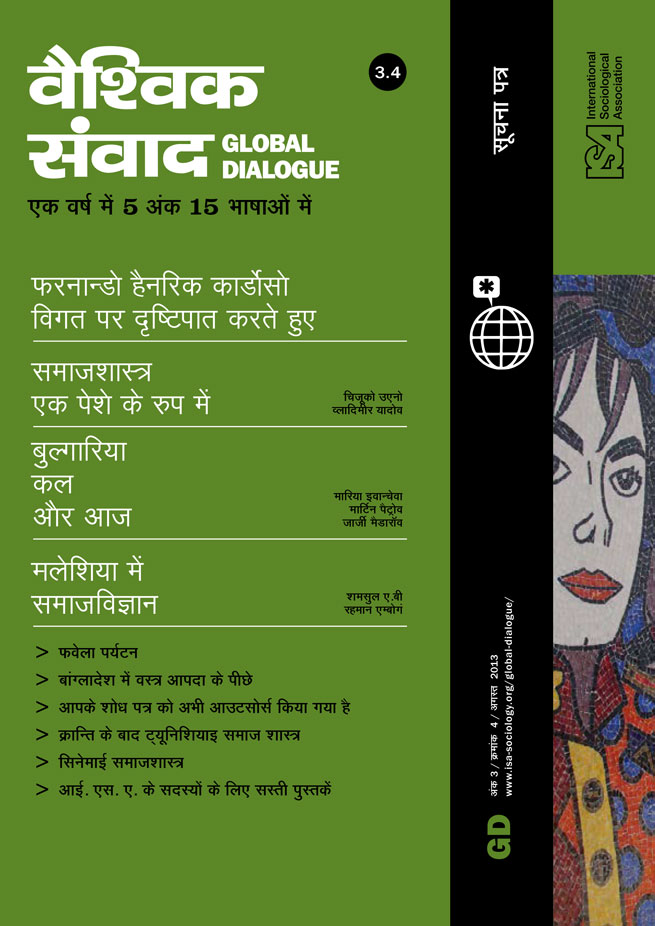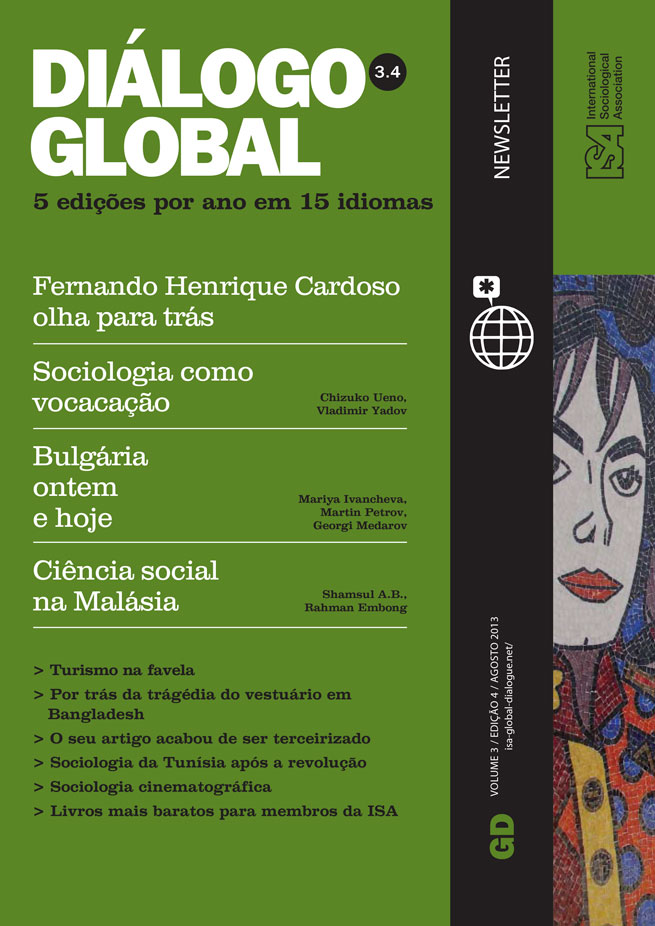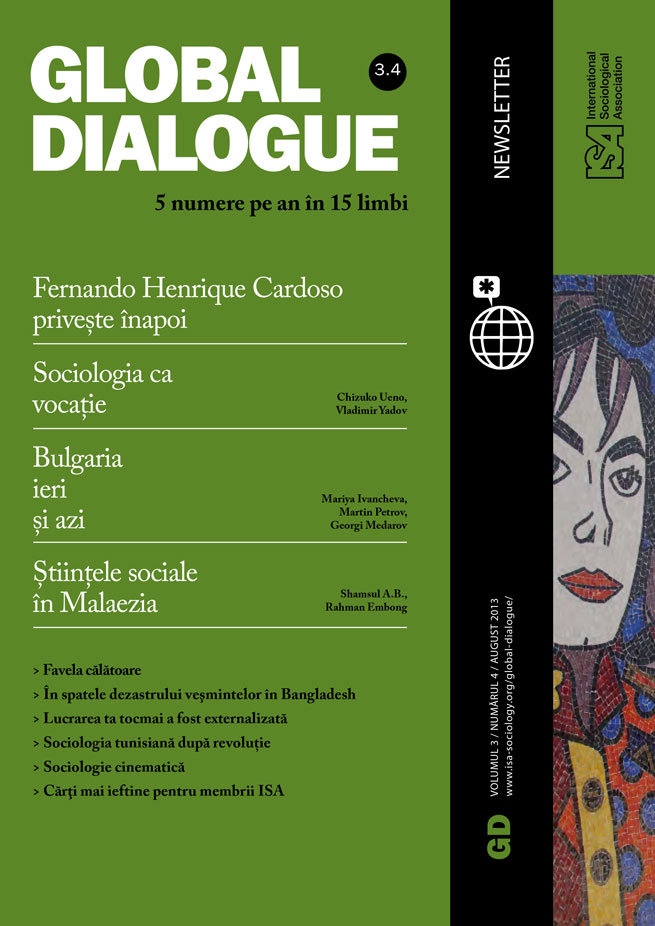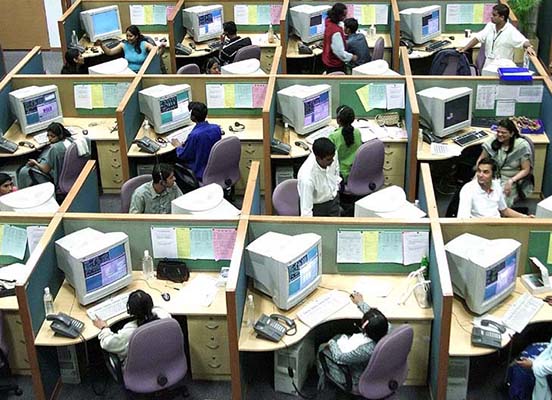Read more about Capitalizing on Poverty

Cheaper Books for ISA Members
by Sujata Patel

Behind the Garment Disaster in Bangladesh
by Mallika Shakya

The Traveling Favela
by Bianca Freire-Medeiros
August 17, 2013
Like most scientists, I long had but a fuzzy conception of what happens to my papers after they’ve been accepted for publication in one of sociology’s journals. If pressed, I might have supposed that the journal editor hands my paper off to an experienced copy editor working in the office next door. For decades, the material constraints of the medium – namely, the fact that paper manuscripts have mass and thus cannot be freely or speedily transported across vast distances – encouraged exactly this: a spatial concentration of the academic publishing process. Journal offices, editorial staff, and printing presses were usually found in the same region, city, or building, and linked to one another through various organizational and interpersonal ties.
But this model is increasingly falling by the wayside. While spending the last several years researching the “knowledge process outsourcing” (KPO) industry in southeast Asia, I’ve conducted fieldwork inside several firms that specialize in the provision of services to publishers located in the global North. These firms employ vast armies of young people and pay them the minimum wage to work long hours as copy editors, typesetters, e-conversion specialists, and so on, which makes them resemble the large assembly plants of foreign corporations, found all over the global South.
The Behemoths of Publishing
If KPO firms are the Foxconns of emergent knowledge supply chains, who are the Apples? To answer this question, we may refer to an ongoing transformation in the field of scientific publishing. Rather than a diffuse network of publishing outlets housed in academic departments, we today find a handful of what a recent Chronicle of Higher Education editorial referred to as “publishing behemoths.”
These are large, publicly traded firms that have been aggressively acquiring ownership rights of academic journals. Although journals in sociology (along with those in fellow “soft” fields such as the humanities) have thus far not been the target of many such acquisitions, the same cannot be said for those in the “hard” sciences. Journals in these fields are increasingly in the hands of global publishing conglomerates that operate as profit-making vehicles.
The most notorious example of such a “behemoth” is Elsevier B.V. This Amsterdam-based publisher is owned by the larger Reed-Elsevier group, which is listed on the London Stock Exchange and multiple other exchanges. According to The Economist, Elsevier B.V. owns over 2,000 academic journals and controls 25% of all content published in the scientific and medical fields. In 2012 it reported profit margins of 40%.
Currently, many scientists are boycotting Elsevier-owned journals because of the exorbitant fees that the firm charges individuals and institutions to access their articles. But the business model utilized by Elsevier and its brethren extends beyond the dissemination of scientific findings. It has seeped into the entire process of producing scholarly work.
Organizing the Supply Chain
Publishing firms are leveraging many new technologies that scientists themselves use in their research and to collaborate with colleagues. Email, file transfer protocol (FTP), word processing software, cloud data-basing, and the like are all rendering obsolete the long-standing imperative to collocate the various aspects of the publishing process. Just as an author can email a Word document to a journal’s editor instantaneously and free of charge, so too can the journal then forward this document to vendors located anywhere in the world.
The new scientific publishing conglomerates such as Elsevier have seized this opportunity by cultivating a network of vendors to whom they outsource an ever-growing array of publication services. These vendors compete amongst themselves to win one or two year service agreements, and they do so by promising acceptable quality at the lowest of prices. This entails applying to the publication process the full array of supply chain management techniques that are currently en vogue inside factories and call centers. Jobs are deskilled, automation relentlessly pursued, and workers are driven to continuously increase their output lest they be written up or replaced.
To give an idea of the complexity of the production process inside these KPO vendors, I can report that should your next paper be accepted by a journal that utilizes this outsourcing model, it will pass across the desktop computers of between 40 and 50 front-line employees in the global South, each of whom are paid about 0.50 USD per hour to do various things to it.
For example, at one such firm where I conducted fieldwork for over a year, the production process unfolded as follows. Authors whose papers had been accepted for publication would email their final paper as a Word document to the journal. The journal would then send the paper via FTP to a data warehouse in the Philippines, where multiple “pre-editors” and “document processors” would do things to it like fix its margins, insure proper formatting of the references, and insert XML tags. The paper would then be sent to one of the company’s facilities in India, where recent college graduates who had undergone a crash course in copyediting would speed-read the paper to correct any obvious typographical or grammatical errors. Now the paper would be sent back to the Philippines, where typesetters would convert it into a journal-specific PDF template, before sending it to India where teams of quality analysts would inspect the PDF for errors.
To this point, all of those who have worked on the paper would have possessed a basic fluency in English. But now, the final PDF is sent to Vietnam, where the company employs legions of non-English speakers who earn a fraction of their Filipino and Indian counterparts. They go through each file and do such rudimentary tasks as checking the spacing and margins on each page and removing any blemishes on the PDFs. But the journey is not yet over, as the files are then sent back to the Philippines, where an entire new production line collates various papers into the final versions of the print and electronic journal editions. From start to finish, the entire process takes scarcely more than a week or two.
Foxconning Science
How should we, as social scientists committed to basic principles of social justice, react to this outsourcing of a key component of the scientific enterprise? There is no easy answer. Calling for boycotts of outsourcing journals merely to protect the jobs of existing workers would be to fall prey to potentially xenophobic strands of protectionism. If an Indian or Filipino copy editor can do the job as well as an American or Canadian, why should they be precluded from doing so?
If, on the other hand, the quality of our papers was being systematically compromised by this system, then we would be justified to act in just such a manner. But, the occasional anecdote aside, it seems that the outsourcing model is for the most part delivering the goods. Just as, at the last ISA conference, I noticed no shortage of Macbooks and iPhones despite the fact that the typical attendee surely disapproves of Apple’s ruthless management of its Asian supply chains, it may be that we are willing to countenance the Foxconning[1] of science as long as it succeeds in getting our papers published in ever-shorter periods of time, across a wider and wider array of outlets (from paper journals to online editions to e-books), and with but a minimal diminution of quality.
At the least, we could demand greater transparency as to what happens to our papers and manuscripts after they have been accepted for publication. Publishing firms go to great lengths to obscure from authors the elaborate supply chains they have cultivated over the past decade, for instance by not allowing copy editors to reveal their nationalities or location when corresponding with authors. But this flies in the face of standard practice in many manufacturing and service industries. US auto firms report what percentage of each vehicle’s parts was produced in the US versus abroad, while Apple itself stamps onto each product the “Designed in Cupertino, Assembled in China” disclaimer. The new breed of corporate/academic publishers should not be allowed to have their cake and eat it too. If they are going to simultaneously leverage global supply chains to cheapen the production process and charge ever-increasing fees for their products, then we scientists, who are both producers and consumers in this peculiar industry/field, deserve to be better informed as to the lives and working conditions of those who labor to turn our initial ideas into polished papers.
Jeffrey J. Sallaz, University of Arizona, USA
This issue is not available yet in this language.
Request to be notified when the issue is available in your language.
If you prefer, you can access previous issues available in your language:





